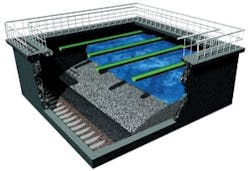L-R: DPWH Sec. Rogelio L. Singson, H.E. Benigno S. Aquino III, Maynilad Chairman Manuel V. Pangilinan, and Muntinlupa Mayor Aldrin L. San Pedro celebrate the inauguration of Maynilad's 100MLD Putatan Water Treatment Plant.
Feb. 4, 2011 -- West Zone concessionaire Maynilad Water Services Inc. (Maynilad) formally unveiled its Putatan Water Treatment Plant last February 3.
President Benigno S. Aquino III led the official unveiling of the water treatment plant, along with Department of Public Works and Highways (DPWH) Secretary Rogelio Singson, Department of Environment and Natural Resources (DENR) Sec. Ramon Paje, Rep. Rodolfo Biazon, officials from the Metropolitan Waterworks and Sewerage System (MWSS), Laguna Lake Development Authority (LLDA), National Water Resources Board (NWRB), Philippine National Railways (PNR), and the National Irrigation Administration (NIA), Parañaque and Muntinlupa local government officials, representatives from the US Embassy, and the Maynilad Board of Directors.
President Aquino lauded the impact of Maynilad's facility. The state-of-the-art treatment plant uses a multi-stage process of Dissolved Air Flotation (DAF), Microfiltration, Reverse Osmosis and Chlorination to ensure that the water from Laguna Lake passes the Department of Health (DOH)-issued Philippine National Standards for Drinking Water (PNSDW).
Maynilad's Putatan treatment plant is the first water treatment facility that taps into Laguna Lake as an alternative water source to Angat Dam. It is the largest membrane-based water treatment plant in the Philippines, and is also the first of its kind in the country to use large-scale microfiltration and reverse osmosis. The facility is a vital part of Maynilad's plan to develop alternative sources of water to ensure long-term water security for its customers.
The President reiterated that Maynilad's milestone accomplishment is ultimately for the benefit of Filipinos. Furthermore, the President expressed his appreciation of Maynilad's contribution since Metro Pacific Investments Corporation (MPIC) and DMCI Holdings Inc. (DMCIHI) took over in 2007.
For his part, Maynilad Chairman Manuel V. Pangilinan recapped the critical role that Maynilad plays in nation building. "From ancient times until today, the sourcing of water and its treatment may seem ordinary, but it remains essential to the building and maintenance of people and cities. This facility symbolizes all that can happen when private business is put to work for the public good," said Pangilinan.
Currently, the Putatan Water Treatment Plant supplies 100 million liters per day (MLD) of potable water to nearly 1.2 million Maynilad customers in the South. Should the need arise, the facility's treatment capacity can be expanded in phases according to the water supply requirements of the West zone.
"Putatan represents the first significant bulk water supply source for the Greater Manila outside Angat dam… but it will not be the last. Putatan is only one part of Maynilad's water plan to seek and develop other locations of water, which can assure long-time supply security for our customers," added Pangilinan.
Pangilinan shared that currently, Maynilad has invested more than P1.4 billion in the establishment of the Putatan Water Treatment Plant. The company, he revealed, is willing to invest another P2.5 billion to expand the facility's capability to 300 MLD.
"Putatan is much more than being about business. It is about sustaining and improving lives. We at Maynilad might be business people, but we are also patriots. We're happy with what we are doing for the greater good, and we hope to be given the chance to do more for this country. After all, that is what private-public sector partnership is all about," said Pangilinan in closing.
Maynilad Water Services Inc. is owned and managed by DMCI-MPIC Water Company Inc. (DMWCI), a joint venture between Metro Pacific Investments Corporation (MPIC) and DMCI Holdings Inc. (DMCIHI). The consortium took control of Maynilad on January 24, 2007.
Maynilad serves the West Zone of the Greater Manila Area, which is composed of the cities of Manila (all but portions of San Andres and Sta. Ana), Quezon City (west of San Juan River, West Avenue, EDSA, Congressional, Mindanao Avenue, the northern part starting from the Districts of the Holy Spirit and Batasan Hills), Makati (west of South Super Highway), Caloocan, Pasay, Parañaque, Las Piñas, Muntinlupa, Valenzuela, Navotas and Malabon -- all in Metro Manila; Cavite City, and the towns of Bacoor, Imus, Kawit, Noveleta and Rosario -- all in Cavite Province.
###



